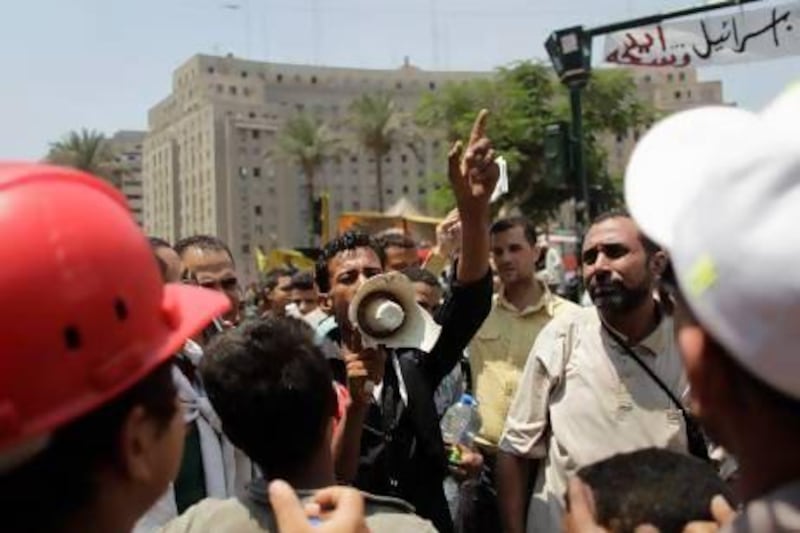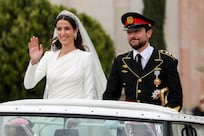CAIRO // Backers and opponents of deposed Egyptian president Mohammed Morsi held rival rallies yesterday as Egypt was mired in political deadlock after the appointment of Mohamed ElBaradei as prime minister was put on hold.
Thousands of Mr Morsi's protesters demonstrated outside a Republican Guard building in Cairo where the former president is believed to be held, chanting "Morsi, Morsi, God is greatest!" and "Peaceful, peaceful!"
On the other side of the capital, liberal protesters gathered in Tahrir Square to demonstrate against the stalled appointment, angry that a Salafist party had led the opposition to the Nobel Prize-winning former diplomat and opposition leader.
It is not known if Mr ElBaradei, who has been ill with flu for the past few days, is still a candidate for the job.
The rival rallies came two days after clashes between the camps left at least 36 dead and more than 1,000 injured nationwide.
Troops were stationed at potential scenes of violence in Cairo and other cities amid fears of renewed violence.
Senior Muslim Brotherhood member Saad Emara said there was no possibility of any negotiations with the new leadership after "all betrayed us", and following the military's clampdown on the group.
"We are not regressing to a Mubarak era but to … a totalitarian regime," he said. "Anything other than protest is suicide."
The appointment of Mr ElBaradei was announced on Saturday, with state media trumpeting his imminent swearing-in before the interim president Adly Al Mansour. The announcement was reversed when the ultraconservative Al Nour Party refused to back him.
When the Egyptian military announced it had removed Mr Morsi from power on Wednesday, it did so at a press conference filled with religious leaders, opposition representatives and a member of Al Nour. Analysts saw the move as politically smart: by including religious conservatives in the transition council they avoided making the popular coup appear to be against political Islam.
Al Nour agreed to support Mr Morsi's removal on the condition that the constitution, which was written by a committee dominated by Islamists, be suspended instead of completely scrapped. The blocking of Mr ElBaradei as prime minister was a "completely unexpected move" from Al Nour, said an adviser to a liberal political party.
"As we understood it, ElBaradei was definitely going to be appointed," the adviser said. "Now we have no clue what is going to happen next."
Coming only four days after Mr Morsi was unseated, the uncertainty ominously foreshadowed an even more difficult task in the coming days: convincing the Muslim Brotherhood, where Mr Morsi was a former deputy leader, to cease protesting and rejoin politics.
The arrests of several Brotherhood leaders without criminal charges has further incensed the former president's supporters and galvanised officials from the group, who have said their members would refuse to have anything to do with the new government, which they say is the illegitimate result of an undemocratic, military coup.
"The whole country is highly mobilised for or against the developments," said Saad Eddin Ibrahim, head of the Ibn Khaldun Centre for Development Studies who was jailed alongside Mr Morsi during the regime of Hosni Mubarak for criticising the government. "I believe the only way out is to quickly begin the process for a general election of the parliament and the presidency."
Another option to solve the divisiveness, Mr Ibrahim said, was to hold a nationwide vote on Mr Morsi's presidency.
"We need to ensure that the Brotherhood are part of the political process, but I think the only way to do that is to have a vote of confidence in Morsi," he said. "They need to be convinced that they are not being thrown out of politics."
Mr Al Mansour, Supreme Constitutional Court chief justice before he was appointed interim president, has declared that no group would be cut out of Egypt's political future and called on the polarised factions to enter a "national dialogue".
Supporters of the president have so far met those calls with defiance. Mohamed Badie, the Supreme Guide of the Brotherhood, gave a fiery speech near the Rabaa Adaweya mosque on Friday where he called on Mr Morsi's supporters to stay in the streets until their "legitimate" president is returned to power.
Unrest spread in Sinai yesterday, where attackers bombed a pipeline providing gas from Egypt to Jordan. Parts of the same pipeline were attacked more than a dozen times after Mubarak resigned in 2011.
Even if the disagreements over the prime minister are resolved soon, the new government of Egypt will face stark challenges with the economy. The uprising against Mr Morsi was due in part to a declining quality of life over the past year. As the former president focused on consolidating political power, joblessness rose, food became more expensive,and petrol shortages common.
Economists say, however, that changing governments will not immediately provide relief. To cut the budget deficit and put the country on track for growth, Egypt's vast and inefficient fuel and food subsidy system will need to be pared back. This challenge convinced some analysts a year ago, when Mr Morsi was elected, that he was accepting a "poison chalice" in taking the presidency.
* Additional reporting by the Associated Press
twitter: For breaking news from the Gulf, the Middle East and around the globe follow The National World. Follow us





